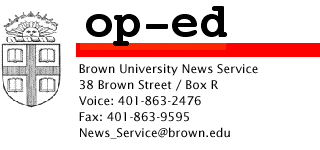

|
Distributed December 2000 Copyright ©2000 by Peter Richardson |
Op-Ed Editor: Janet Kerlin About 750 Words |
|
Peter Richardson Can reliving history teach and change us? The family who volunteered to live in “The 1940 House” have found themselves changed by the experience, differently from their prior expectations. This sounds like the mark of education: that it produces positive changes in oneself to carry forward in life. Can immersion in history, even if vicariously shared, teach us effectively? Imagine looking at a newspaper Web site and finding yourself peering into the front room of the actual house where you were brought home as a baby, learned to crawl, learned to walk? In the photo in front of you there are a couple of boys in the clothes typical when you were that age, sitting on the carpet in front of the fireplace, as if they’d come to play with you. This time warp happened to me. The photo was online at the Electronic Telegraph, the online version of The (London) Daily Telegraph. In reading the story around the photo I could see it was the boys in the picture for whom this was more of a time warp. They are part of a family who volunteered to live in this West Wickham house for several weeks under the eyes of video cameras, living the life of the period – not an easy one, as it began in 1939 with war being declared by Britain on Germany. The family was immersed in the period, having to wear the clothes of the day, eat the food of the time (and there was rather little of it; suet pudding substituted for meat), cope with the lack of central heating, washing machines and other amenities, and face the uncertainties of the bombing and the air war (simulated) relentlessly going on overhead. The sound effects come as close as possible to the uncertainty of waiting for the unique, loud sound of a German V-1 flying bomb to approach and then fade away. Before the age of 10, I learned that the fading sound meant the bomb would crash somewhere away from us. Late in the war, a flying bomb landed in the woods across the street and opposite our second house, luckily when no one was home. It blew a clearing in the woods and blew out all the windows in the house. Glass shards scraped long gouges in the piano. The volunteer family was learning about history by reliving it, with the physical context well reproduced. Their experiences were being determined by Channel 4 Television in England, which took the family, unrehearsed, through introduction of rationing, getting news from the radio each evening, doing volunteer work, digging and installing a bomb shelter in the back garden and spending evenings and nights in it, hearing the Doodle Bugs (the British nickname for flying bombs) – and being thrown together as a family in mutual interdependence quite untypical of the present. Perhaps “The 1940 House” will be shown here by PBS, as was the previous “1900 House.” I think they offer a great exploration of how we study history. Unlike seeing historical film footage, examining historical artifacts in museums, or reading contemporaneous accounts, such series let us watch members of our current culture react to living in such conditions. To what extent may people interact in such a setting rather like the people who were actually faced with the problems, the perils, the uncertainties of the original times? Is there a persistent cultural determination of family interactions in specific circumstances, as anthropologists often claim? Would we act like them? There is a difference here from watching a scripted performance of actors. The observable behavior of unrehearsed volunteers who are our own contemporaries should offer a view (especially to those of us who were there for the original!) as to how well the reliving matched the typical original, how similar the responses and interactions are. The volunteers have found themselves changed by the experience, differently from their prior expectations. This sounds to me like the mark of education: that it produces positive changes in oneself to carry forward in life. It would be very interesting to know if the lesser immersion obtained by viewers of the series nevertheless can produce on some scale changes similar to those for the participants. We know from holidaying how unusual and unexpected immersion away from our normal routines can cause permanent, positive changes for us; can immersion in history, even if vicariously shared, teach us effectively? My personal footnote: my father was always conscious of living with historical connections. He told me he’d often wheeled me as a baby in my pram through the Anne Boleyn Woods, not far from that house, said to be a trysting place she had with Henry VIII. My father lived in that house until he died in his 90s, in 1999, and he’d have been delighted that his old house is having its turn in the telling of history. Peter Richardson, professor of engineering and physiology, lived in southeast England through and after World War II. He is a fellow of The Royal Society, the science academy of the United Kingdom. ###### | |